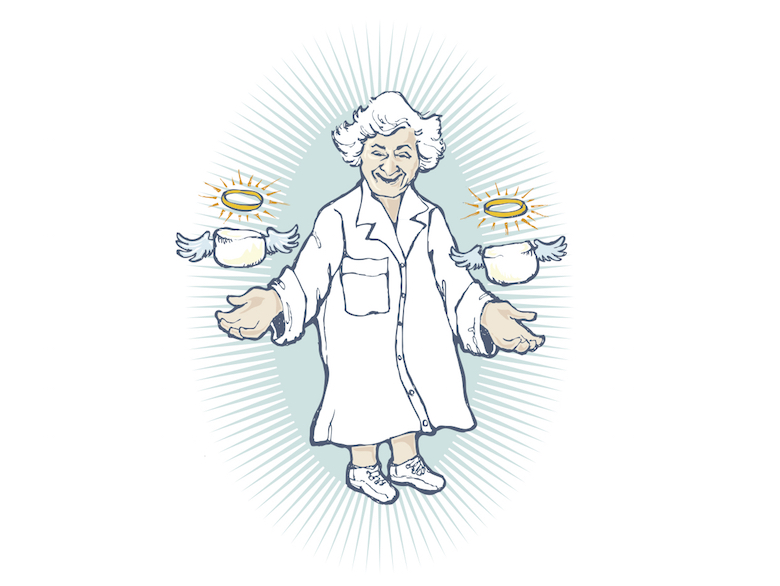Picture the 2:00 a.m. scene at Metropolitan Avenue and Lorimer Street, one of Williamsburg’s liveliest corners: Groups of 20-somethings smoking cigarettes on the sidewalk. Bass lines filtering out from neon-lit bars. And 91-year-old Georgiana Tedone DiPalma, waking up to make mozzarella.
Until she retired in August, DiPalma had sliced, kneaded and twisted every night, until she had individually packaged two dozen balls of perfect curd. Then, at 6:00 a.m., she would open for business.
DiPalma was the owner and sole employee of Tedone Latticini, an 89-year-old Italian dairy store in what used to be the heart of Italian Williamsburg. Her shuttering of the landmark leaves few relics of the neighborhood’s past: three blocks west runs Graham Avenue, also known as “Via Vespucci,” while surrounding blocks are home to century-old Italian clubs like the Saint Mary of the Snow Society (established 1888) and bakeries like Fortunato Brothers Café.
In recent years, Tedone Latticini’s corner shared space with a motley collection of dive bars and 24-hour delis, but DiPalma, who had lived in an apartment behind the store since she was born, didn’t mind the ruckus. “The crowds don’t bother me,” she said earlier this summer, before arthritis took its toll on her hands. “Look, it used to be trolley cars.”
Small-framed and impeccably coiffed, DiPalma (Georgie to most) had long sworn she’d never close up the shop, which her parents, who emigrated from Italy in 1916, opened together in 1921, when Williamsburg was filling up with Italian immigrants in pursuit of the American dream. “When I was younger, I wanted to be a secretary,” recalled DiPalma. “I could type 120 words per minute. Had a job at MetLife. But then my father died, and I had to help my mother raise my two brothers. I worked in the store so that she could watch them and still make a living.”
Her parents taught her to make mozzarella when she was 16, and every day for the next 75 years she melted Polly-O whole milk curd in hot water and stretched it by hand into smoothed elastic strands, which she twisted into neat, pound-size balls. Cooked and pulled cheeses like mozzarella or scamorza are known as pastafilata (or “spun paste”) style cheeses, hard work for even the most able of bodies, but even at the end, DiPalma worked alone: “I’m used to it,” she’d shrug. “I can’t really explain it to anyone else.”
The store’s stock of Italian provisions had dwindled to a handful of Boar’s Head cold cuts and some ancient canned tomatoes, but DiPalma’s mozzarella remained a milky white touchstone. Each oozing ball spent the day unrefrigerated on a cookie sheet on the counter. You could slice it into rounds or not even bother—it unraveled in wide, salt-kissed ribbons from the outside in, perfect for snacking straight. On Saturdays, if you brought in your own bread, she would make you a roast beef and mozzarella sandwich, a sloppy and beautiful thing.
Though DiPalma’s husband passed away 33 years ago, she was seldom on her own because the store was a social hall. Peter the neighborhood knife sharpener would stop in, telling of how he recently brought his retired father some of DiPalma’s mozzarella: “My dad said, ‘That’s my Georgie, she still makes it the best.’ I went to this superstore in Florida where my dad lives, and they had it all under one roof: meat, cheese, prescriptions, socks. It’s the ruination of the mom and pop store. You just can’t get the level of quality you do here when you’re selling all that stuff at once,” he sighed.
Some of DiPalma’s neighbors, like Becky Nieves, would spend a few hours every afternoon helping with the store—sweeping up, slicing meat for customers—and watching the neighborhood change. “I live down the street, so I tried to come help her as much as I could,” said Nieves. “I had a lot of regular customers that I became friends with,” said DiPalma. “But most of them have moved out of the area, or passed away.”
The street scene became almost unrecognizable, but DiPalma remained devout in her loyalty to the neighborhood. “This is still a good area, full of families, with good schools and good churches. Look at this,” she said as she pulled out a photo album of her smiling children, grandchildren and great-grandchildren. “This is a good Catholic family. I do believe in God. There is a God up there—you can’t get away with any nonsense.”
I once asked DiPalma what would happen to her store when she wasn’t around to take care of it. “I might try to sell it before I go. No one in my family wants it. If I can’t sell it, I don’t care—I’m going out in a box anyway. With a job like this, you don’t ever retire.”
Sadly for us, it turns out Georgie was wrong. In August she closed up Tedone and headed to New Jersey, to see her grandchildren.
“Now I’m 91,” she said. “That’s a long time to be making cheese.”
DiPalma had long sworn she’d never shutter the shop her parents opened in 1921. They’d taught her to make mozzarella when she was 16, and every day for 75 years she melted milk curd and stretched it into smoothed elastic strands, which she twisted into neat, pound-sized balls. The store’s stock of Italian provisions had dwindled, but those oozing orbs, which sat unrefrigerated on the counter until they sold out around noon, remained a milky white touchstone.




